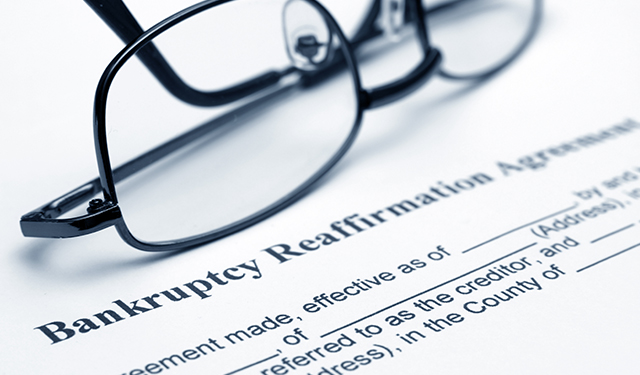From a Debtor’s perspective, there is nothing good about a Reaffirmation Agreement, they are generally bad and can turn ugly! Under the United States Bankruptcy Code, a debtor, with respect to personal property, such as an automobile, must elect to either surrender the collateral to the creditor or reaffirm the debt with the creditor.
What is a Reaffirmation Agreement?
A Reaffirmation Agreement is an agreement between you and the creditor, approved by the Bankruptcy Court, whereby you agree to keep the collateral and make payments in accordance with the agreement. An approved Reaffirmation Agreement makes the underlying debt non-dischargeable, meaning if you are unable to make payments in the future and the asset is repossessed, you will be personally liable for any deficiency balance on the debt.
Example. You purchase an automobile prior to filing your bankruptcy case. You could not afford to pay cash for the vehicle so Bank A finances the vehicle for you and takes a lien against the vehicle. Two years after you purchased the vehicle, you are forced to file for bankruptcy protection. The vehicle is worth $8,000.00, but the amount owed to Bank A is $14,000.00. You enter into a Reaffirmation Agreement during your bankruptcy case, and the Court has approved the agreement.
Eight months later, you are unable to continue to make the payments on the vehicle and it is repossessed. At this time, the vehicle is now worth $7,000.00 and you still owe $13,500.00. Bank A sells the vehicle and receives $7,000.00 (usually the creditor will sell the vehicle at an auction for less than the fair value); at this point, there is a deficiency between what you owe and what Bank A received of $6,500.00. This amount is the deficiency balance that Bank A will seek to recover from you because the underlying debt was not discharged in your bankruptcy case.
The foregoing example demonstrates that the approved Reaffirmation Agreement is good for the creditor; that entering into the agreement and its approval was bad, and that the post-bankruptcy repossession makes the agreement ugly!
When you want to keep the collateral, you have no choice but to reaffirm the debt. However, whether the Court will approve the Reaffirmation Agreement depends on a number of circumstances. The Court will look to see whether the agreement is in your best interest.
Initially, your attorney can determine whether reaffirmation is in your best interest and, if your attorney believes that it is, your Reaffirmation Agreement can be approved by your attorney and the agreement can be approved by the Court without a hearing.
What will your attorney and the Court look at to determine whether reaffirming a debt is in your best interest? First, your attorney will review your post-petition budget. Does your attorney believe that you can afford to make the payments based upon your budget? Your attorney will ignore your pre-petition payment history with the creditor and merely look at your current budget. Next, your attorney may attempt to negotiate with your creditor to either lower your interest rate or the principal balance owed; this is generally unsuccessful, but your attorney may try.
What happens if your attorney cannot approve the Reaffirmation Agreement? In this case, the creditor will set a hearing on the Reaffirmation Agreement. Both you and your attorney will attend the hearing and your attorney will explain to the Court why the Reaffirmation Agreement is not in your best interest. At this point, the Court will make a ruling. The Court will often agree with your attorney that the Reaffirmation Agreement is not in your best interest and, therefore, not approve the agreement. When the Court does not approve the Reaffirmation Agreement, YOU WIN!
How did I just win? By the Court not approving the Reaffirmation Agreement, you will still receive a Discharge to the underlying debt! You merely continue to make the regular payments and the creditor is unable to repossess the collateral as there is no basis for repossession… just like if the Reaffirmation Agreement was approved. BUT, if you are unable to continue to make the payments in the future and the creditor repossesses the collateral, you will NOT be personally liable for any deficiency balance.
Let’s return to our previous example and see how the non-approval changes things.
Example. You purchase an automobile prior to filing your bankruptcy case. You could not afford to pay cash for the vehicle so Bank A finances the vehicle for you and takes a lien against the vehicle. Two years after you purchased the vehicle, you are forced to file for bankruptcy protection. The vehicle is worth $8,000.00, but the amount owed to Bank A is $14,000.00. You enter into a Reaffirmation Agreement during your bankruptcy case, but the Court did not approve the agreement.
Eight months later, you are unable to continue to make the payments on the vehicle and it is repossessed. At this time, the vehicle is now worth $7,000.00 and you still owe $13,500.00. Bank A sells the vehicle and receives $7,000.00 (usually the creditor will sell the vehicle at an auction for less than the fair value); at this point, there is a deficiency between what you owe and what Bank A received of $6,500.00. This amount is the deficiency balance that Bank A can NOT seek to recover from you because the underlying debt was discharged in your bankruptcy case.
The foregoing has been a general overview of the Chapter 7 bankruptcy Reaffirmation Agreement process and is not meant to provide legal advice to your specific situation. For answers to your specific legal issues, you should consult with Vannova Legal.







Post a Comment